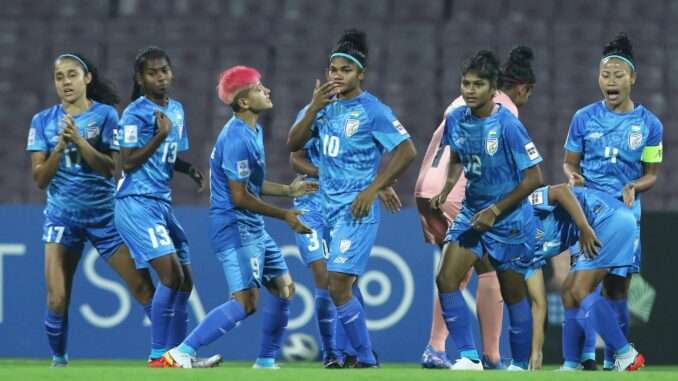
Brave is the person who stages an international tournament in the middle of the worst global pandemic in a century.
With players, staff and officials flying in from all different parts of the world, amid a worsening Omicron-led spike in cases around the world, the challenges and difficulties of playing through COVID are arguably as challenging now as they ever have been over the past 24 months.
Nothing is easy. Everything that was already difficult about staging an international tournament has been amplified ten fold. It is an impossible and mostly thankless task.
We were reminded just how challenging and difficult that task is this week when news filtered through that India, the host nation of the ongoing AFC Women’s Asian Cup, had suffered a COVID outbreak within their squad and, coupled with some injuries, were unable to field the minimum required 13 players in order to take the field.
As per the tournament regulations they were, as such, deemed to have forfeited the match and any forfeiture also means exclusion from the competition.
For a nation that had invested so much into hosting this tournament, and for the players who had given so much over the last few years to prepare for this tournament, their big moment in the sun, with genuine hopes of World Cup qualification at the end of it, it was the cruellest way to bow out.
The speed with which this Omicron wave has taken hold has been breath-taking.
India’s Delta-led wave last year saw cases peak at over 400,000 per day in the early part of May. By the end of 2021, with the Women’s Asian Cup just a matter of weeks away, that number had been reduced to as little as 5000 per day.
Yet, within the space of the past month, it hasn’t been so much as an Omicron wave as a tsunami with numbers reaching as high as 350,000 per day just a few days ago.
The Women’s Asian Cup has, unfortunately, not been immune.
Aside from India there have been reported cases in a handful of other nations, although these were generally recorded either before or upon arrival in India and thankfully, all appear to have been spared the fate which has befallen India.
But every day presents a risk, and every day without a situation like that which crippled India must be considered a success. The Asian Football Confederation and All India Football Federation will be holding their collective breaths each and every day as they attempt to play ‘Frogger’ on its most difficult setting.
While the two bodies have come in for criticism for a lack of forward planning and flexibility, there was little they could do in this situation.
Tournaments such as the Women’s Asian Cup are inflexible in their nature. Schedules are scribed into rock with very little, if any, scope for change.
While, as the host nation, the option of drafting in reserves at short notice is an ‘easy’ one, what would happen should the same situation occur with Iran or Myanmar? How quickly could they, at the drop of a hat, get five to ten (or maybe more) players to India to participate?
How much would the tournament need to be delayed in order to accommodate players recovering, or new players being drafted in? Tournaments such as this have a specific window in which they must be completed. Players have club sides from all around the world they need to return to.
You can’t imagine Chelsea would be too impressed with Sam Kerr staying away another few weeks to accommodate a delay in schedule. Or Lyon with Ellie Carpenter. Or WE.League teams with their players. Or A-League Women’s teams with theirs (especially with finals approaching). You get the point.
Perhaps there could have been consideration for allowing larger squads, knowing this was a possibility at some stage during the tournament. We have seen that before with the Euros last year, and perhaps that could and should have happened in this situation.
But accommodating an extra, let’s say five, players per team comes with significant added cost and resource. While nations such as Japan or Australia could comfortably afford such an increase, others with more modest resources, would struggle.
This is a situation no one wanted, but as shattering as it is for all involved, there were few other realistic alternatives.
As India gets over the heartbreak, we can only hope this is the last COVID disruption to the tournament. This, like all tournaments, should be remembered for the incredible feats on the field, not what happens off it.
Photo: twitter/IndianFootball
Listen to Episode 77 of The Asian Game podcast as we discuss India’s withdrawal from the 2022 AFC Women’s Asian Cup




